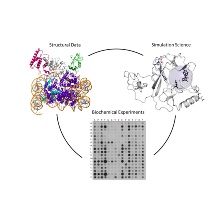New publication in "Critical Reviews in Biochemistry and Molecular Biology"
Protein lysine methyltransferases (PKMTs) transfer up to three methyl groups to the side chains of lysine residues in proteins and thereby fulfill vital regulatory functions in cells by controlling protein stability, localization and protein/protein interactions. The methylation reactions are highly regulated, and aberrant methylation of protein is associated neurologic disorders, cardiovascular diseases, and various types of cancer. Biochemical experiments have unraveled many mechanistic features of PKMTs concerning the substrate and product specificity, processivity and the effects of genetic mutations in PKMTs. Structural data provided information about the substrate recognition, complex formation and allowed for simulations of the substrate peptide interaction and mechanism of PKMTs with atomistic resolution by molecular dynamics and hybrid quantum mechanics/molecular mechanics methods. These simulation technologies uncovered further mechanistic details of the PKMT reaction mechanism including the processes responsible for the deprotonation of the target lysine residue, conformational changes of the PKMT upon substrate binding, but also rationalized regulatory principles like PKMT autoinhibition. This review describes the novel insights into the catalytic machinery of various PKMTs achieved by the combined application of biochemical experiments and simulation approaches during the last years. The results summarized in our review impressively illustrate the exquisite power of the investigation of enzyme mechanisms by combined application of biochemical experiments and simulation technologies.
Contact

Albert Jeltsch
Prof. Dr.Head of Biochemistry department and acting director IBTB


